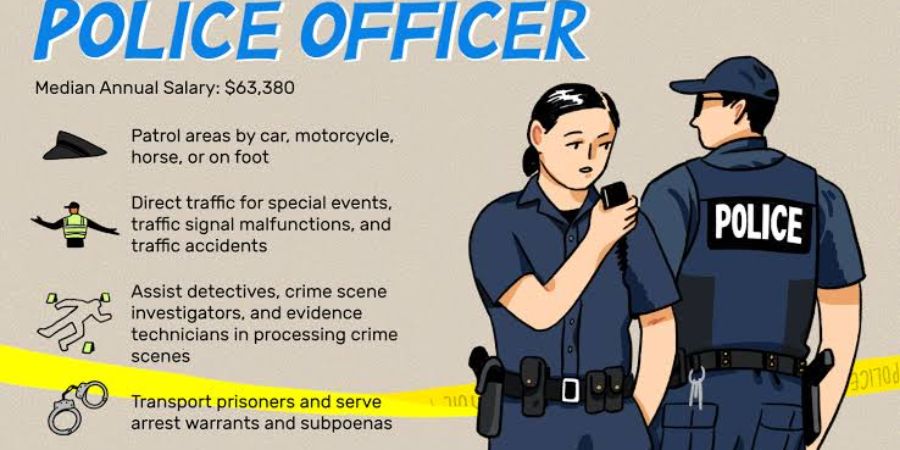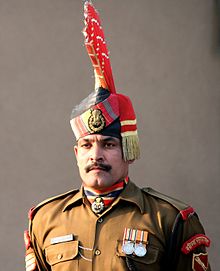

Indian law is enforced by a number of agencies. Like many federal nations, the constitution of India delegates the maintenance of law and order primarily to the states and territories.

The President of India Ram Nath Kovind with Indian Police Service Officers at the Rashtrapathi Bhavan in New Delhi.

Security personnel at India-Pakistan border
At the federal level, some of India's paramilitary forces are part of the Ministry of Home Affairs and support the states. Larger cities have police forces under their respective state police. All senior officers in the state police forces and federal agencies are members of the Indian Police Service (IPS).[citation needed]

Union Home Minister Rajnath Singh presents medals and awards to CISF personnel and cadets.
The central agencies are controlled by the central government. Most federal law-enforcement agencies are under the Ministry of Home Affairs. The head of each agency is an IPS officer. The constitution assigns responsibility for maintaining law and order to the states and territories, and almost all routine policing—including the apprehension of criminals—is done by state-level police forces. The constitution also permits the central government to participate in police operations and organization by authorizing the creation of the Indian Police Service.

Exhibit of the Railway Protection Force, Rapid Action Force, National Security Guard, and Intelligence Bureau at the National Police Memorial and Museum in New Delhi.
Central police forces can assist a state's police force if requested by a state government. During the 1975-77 Emergency, the constitution was amended on 1 February 1976 to permit the central government to deploy its armed police forces without state permission. The amendment was unpopular, and use of the central police forces was controversial. After the Emergency was lifted, the constitution was again amended in December 1978 to restore the status quo.
The principal national ministry concerned with law enforcement is the Ministry of Home Affairs (MHA), which supervises a large number of government functions and agencies operated and administered by the central government. The ministry is concerned with matters pertaining to the maintenance of public peace and order, the staffing and administration of the public services, delineation of internal boundaries, and the administration of union territories.
In addition to controlling the IPS, the Ministry of Home Affairs maintains several agencies and organizations dealing with police and security. Police in the union territories are under the MHA. The Minister of Home Affairs is the cabinet minister responsible for the ministry; the Home Secretary, an Indian Administrative Service (IAS) officer, is the ministry's administrative head.
Main article: Central Armed Police Forces
The Border Security Force (BSF) is responsible for policing India's land borders in peacetime and preventing trans-border crimes. A central police force under the Ministry of Home Affairs, its duties include VIP security, election supervision, guarding vital installations and counter-naxal operations.
The Indo-Pakistani War of 1965, which highlighted the inadequacy of the existing border-management system, led to the formation of the Border Security Force as a unified central armed police force mandated with guarding India's boundary with Pakistan. The BSF's policing capability was used in the Indo-Pakistani War of 1971, against the Pakistani Armed Forces, in areas which were the least threatened. During wartime or when ordered by the central government, the BSF is commanded by the Indian Army; BSF troops participated in the 1971 Battle of Longewala in this capacity. After the 1971 war (which led to the creation of Bangladesh), responsibility for policing the border with Bangladesh was assigned to the force.

Indian Border Security Officer in ceremonial uniform.
Originally charged with guarding India's external borders, the BSF has been tasked with counter-insurgency and counter-terrorism operations. When insurgency in Jammu and Kashmir broke out in 1989 and the Jammu and Kashmir state police and the thinly-deployed Central Reserve Police Force (CRPF) needed extra force to cope with spiraling violence, the central government deployed the BSF to Jammu and Kashmir to combat Kashmiri militants.
BSF operates a Tear-Smoke Unit at its academy in Gwalior, Madhya Pradesh, which supplies tear gas and smoke shells for riot prevention to all state police forces. It operates dog squads, and runs the National Dog Training and Research Centre. The BSF, one of several Indian police forces which have its own air and water wings, provides helicopter, dog and other support services to the state police.
The Central Industrial Security Force's (CISF) primary task is to provide industrial security.[1] It guards industrial installations nationwide which are owned by the central government, secures seaports and airports, and provides security for certain non-governmental organizations. The CISF provides security for nuclear-power plants, space installations, mints, oil fields and refineries, heavy-engineering and steel plants, barrages, fertilizer units, hydroelectric and thermal power stations, and other installations partially (or wholly) run by the government.[2]
The Central Reserve Police Force's (CRPF) main objective is to assist states and union territories' law-enforcement agencies in maintaining law and order and containing insurgency. It is deployed as an anti-terrorist unit in several regions, and operates abroad as part of United Nations peacekeeping missions.[3]
The 90,000-member Indo-Tibetan Border Police (ITBP) is responsible for security along the 2,115-kilometre (1,314 mi) Indo-Tibetan border and its surrounding areas. ITBP personnel are trained in maintaining law and order, military tactics, jungle warfare, counter-insurgency, and internal security. They are also deployed to Indian diplomatic missions located in Afghanistan.[4]
The National Security Guard (NSG) is a commando unit originally created for counter-terrorism and hostage-rescue missions. Founded in 1986, it is popularly known as the "Black Cats" for its uniform. Like most military and elite-security units in India, it avoids the media and the Indian public is largely unaware of its capabilities and operational details.
The NSG draws its core members from the Indian Army, and the balance is support staff from other central police units. An NSG team and a transport aircraft is stationed at Indira Gandhi International Airport in New Delhi, ready to deploy in 30 minutes.
Sashastra Seema Bal (SSB), founded in 1963, is deployed at the Indo-Nepal and Indo-Bhutan borders. SSB, with over 82,000 personnel, is trained in maintaining law and order, military tactics, jungle warfare, counter-insurgency, and internal security. Its personnel are also deployed to the Intelligence Bureau (IB), Research and Analysis Wing (R&AW), Special Protection Group (SPG), National Security Guard. Officers begin as an assistant commandant (equivalent to deputy superintendent of police on a state force), and retire with the rank of inspector general (IG).
The Special Protection Group (SPG), the central government's executive protection agency, is responsible for the protection of the Prime Minister of India and their immediate family. The force was established in 1985, after the assassination of Indira Gandhi. It provides daily, round-the-clock security throughout India to the present Prime Minister and his family.
The Central Bureau of Investigation (CBI) is India's premier investigative agency, responsible for a wide variety of criminal and national security matters. Often cited as established with the Delhi Special Police Establishment Act, 1946, it was formed by the central government (which controls the Delhi police) with a resolution. Its constitutionality was questioned in the Gauhati High Court Narendra Kumar vs Union of India case on the basis that all areas of policing are exclusive to state governments, and the CBI is a central-government agency. The court ruled that despite the lack of legislation, the CBI is an authorized agency of the central government for national policing. Its ruling was upheld by the Supreme Court of India, which cited the CBI's national importance.
The bureau is controlled by the Department of Personnel and Training in the Ministry of Personnel, Public Grievances and Pensions of the government of India, usually headed by the Prime Minister as the Minister of Personnel, Public Grievances and Pensions. India's Interpol unit, the CBI draws its personnel from IPS officers throughout the country. Specializing in crimes involving high-ranking government officials and politicians, the CBI has also accepted other criminal cases because of media and public pressure (usually due to local-police investigative incompetence).
Main articles: Directorate General of Income Tax Investigation, Investigation Division of the Central Board of Direct Taxes, and Chief Commissioner of Income Tax Central

Directorate General of Income Tax Investigation helicopters are supplied by the Indian Air Force.
The Income Tax Department (ITD) is India's premier financial agency, responsible for a wide variety of financial and fiscal matters. The department is controlled by the Department of Revenue in the Ministry of Finance, headed by a minister who reports directly to the prime minister. The Central Board of Direct Taxes (CBDT) is also part of the Department of Revenue. It provides input for policy and planning of direct taxes, and is responsible for the administration of direct-tax laws through the Income Tax Department. The CBDT operates in accordance with the Central Board of Revenue Act, 1963. The board members, in their ex officio capacity, are also a division of the ministry dealing with matters relating to the levy and collection of taxes, tax evasion and revenue intelligence. It is India's official Financial Action Task Force on Money Laundering (FATF) unit. The Income Tax Department draws its staff from Indian Revenue Service officers nationwide, and is responsible for the investigation of economic crimes and tax evasion. Some special agents and agents can carry firearms.[5]
The Directorate of Criminal Investigation (DCI) is headed by the Director General of Intelligence (Income Tax), which was created to address cross-border black money. The DCI conducts unobtrusive investigations of "persons and transactions suspected to be involved in criminal activities having cross-border, inter-state or international ramifications, that pose a threat to national security and are punishable under the direct tax laws."[5]
Commissioners of the ITD's intelligence directorate posted in cities such as Delhi, Chandigarh, Jaipur, Ahmedabad, Mumbai, Chennai, Kolkata, and Lucknow will also conduct criminal investigations for the DCI. The ITD's intelligence wing oversees the Central Information Branch (CIB), which has a repository of data on taxpayers' financial transactions.
The Directorate of Revenue Intelligence (DRI) is an intelligence-based organization responsible for the coordination of India's anti-smuggling efforts. Officers are drawn from the Indian Revenue Service and Group B[clarification needed] of the Central Board of Indirect Taxes and Customs.
The Central Economic Intelligence Bureau (CEIB) is the intelligence agency responsible for gathering information and monitoring the economic and financial sectors for economic offenses and warfare.
The Directorate General of Central Excise Intelligence (DGCEI), formerly known as the Directorate General of Anti-Evasion, is an intelligence-based organization responsible for tax-evasion cases related to central excise duty and service tax. Officers are drawn from the Indian Revenue Service and Group B of the Central Board of Excise and Customs.
The National Investigation Agency (NIA), the central agency combatting terrorism, can deal with interstate terror-related crimes without permission from the states. The National Investigation Agency Bill 2008, creating the agency, was moved in Parliament by the Home Minister on 16 December 2008.[6][7][8] The NIA was created in response to the 2008 Mumbai attacks as a central counter-terrorism agency. Also dealing with drug trafficking and currency counterfeiting, it draws its officers from the IRS and the Indian Police Service.
The Narcotics Control Bureau is responsible for anti-narcotics operations nationwide, checking the spread of contraband and the cultivation of drugs. Officers in the bureau are drawn from the IPS and IRS.
The Bureau of Police Research and Development (BPRD) was established on 28 August 1970 to modernize the police forces. It researches police issues, including training and the introduction of technology at the central and state levels.
